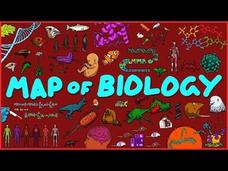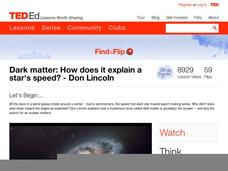PBS
Supersymmetric Particle Found?
With the large hadron collider running out of places to look for clues to a deeper theory of physics, we need a bigger particle accelerator. We have one - the galaxy.
Brainwaves Video Anthology
Stephen Wolfram - Computational Thinking
Stephen Wolfram, (born August 29, 1959, London, England), English physicist and author best known for his contributions to the field of cellular automata and the development of Mathematica, an algebraic software system, and Wolfram...
Domain of Science
Map of Biology
Biology is the subject that studies life in all its forms, from the simple cell through to all the animals that inhabit the planet. In this map I lay out the subject of biology and how all of the sub-disciplines are related to each...
AsapSCIENCE
This ≠ That
Some things are not as they seem. Subscribe! http://bit.ly/asapsci GET THE ASAPSCIENCE BOOK: http://asapscience.com/book/ Created by: Mitchell Moffit and Gregory Brown Written by: Rachel Salt, Amanda Edward, Gregory Brown & Mitchell...
Curated Video
Should You Actually Drink Your Own Pee To Survive?
Many survivalists have cited urine as a great way to avoid being dehydrated in extreme situations but that isn't completely true. Despite being composed of almost 95% water, pee still has waste and trace amounts of bacteria that could...
TED-Ed
The Search for Other Earth-like Planets
Olivier Guyon, professor of optical science and astronomy, explains how scientists are searching for other planets that can support life. Viewers learn the odds of finding a habitable planet, how long it would take, and some techniques...
Bozeman Science
Plant Nutrition and Transport
Discuss what nutrients plants require and where they get them from. An informative video explains the dermal, vascular, and ground tissue in both monocot and dicot roots, as well as stems and leaves.
TED-Ed
The Secret Lives of Baby Fish
Dive into an exploration of the life cycles of coral reef fish with this short instructional video. Starting off as larvae floating in the oceans' currents, these little fish can travel thousands of miles, avoiding numerous hazards...
TED-Ed
Inside the Ant Colony
Step into the amazing world of ants as this video explores the surprisingly complex social structure that makes up the foundation of every ant colony. The truly amazing ability of these tiny creatures to share information...
TED-Ed
Biofuels and Bioprospecting for Beginners
The use of fossil fuels is contributing to the amount of carbon dioxide in the atmosphere. If we can produce fuels using cellulose-based ethanol, we may be able to remove carbon dioxide in the atmosphere. Scientists are searching for a...
Domain of Science
The Map of Biology
Many define biology as the study of life but can't agree on a definition of life. Trying to explain all of the domains and subdomains of biology seems a bit easier than defining life. See a full map of the topics covered by the general...
TED-Ed
Dark Matter: How Does it Explain a Star's Speed?
Studying spiral galaxies can make your head spin! With this video, find out how astronomers calculate a galaxy's rotational speed, and how the prediction that the outermost stars slow down does not seem to be true. The mystery may be...
Bozeman Science
Nervous System
The average adult human brain contains 100 billion neurons. In the video, scholars learn about brain lateralization and how different portions of our brain do different things. Learners then explore neurons, learning their parts and how...
TED-Ed
The First Asteroid Ever Discovered
Flash back to 1801 to meet Ceres, the first asteroid discovery! Use a video lesson to learn how careful plotting and measuring led to the discovery of Ceres. Once lost, mapping the orbit led to new astronomy and new mathematics to...












